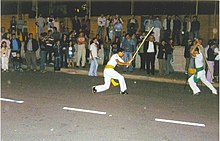Jogo do Pau
 |
|
| Focus | Weapons (sticks) |
|---|---|
| Country of origin |
|
| Olympic sport | No |
Jogo do pau (Portuguese pronunciation: [ˈʒoɣu du ˈpaw], "game of the stick") is a Galician and Portuguese martial art which developed along the Minho river and its surrounding regions (Minho, Trás-os-Montes, Pontevedra and Ourense), focusing on the use of a staff of fixed measures and characteristics. The origins of this martial art are uncertain, but its purpose was primarily self-defence. It was also used to settle accounts, disputes and matters of honour between individuals, families, and even villages. While popular in the northern mountains, it was practically unknown elsewhere, and those who did practise it were taught by masters from the Norte Region, Portugal and Galiza.
The popularity of this martial art was partly due to the demeanor of the northern folk, who valued personal and family honor enough to kill for it. It was also due in no small part to the relative ease of obtaining a staff as well as the versatility of such a tool: a staff or stick was almost universally present, used as a support for the long daily walks, to help cross the rivers, by the shepherds to protect the cattle from wild animals, and so on. There are references to this martial art being used by the guerrilla against the troops of Napoleon that were occupying Lisbon during the Peninsular War.
The origins of the jogo do pau are medieval civil techniques of combat, used in times of war by foot soldiers who were often poor peasants who could not afford a better weapon. Evidence of this are found, for instance, from reports on the Battle of Aljubarrota. The technique was incorporated into horseback riding in the medieval book A ensinança de bem cavalgar em toda a sela ("The art of being a good horseman on any saddle") by Edward of Portugal (1391–1438). This martial art developed not in the urban areas more open to foreign influences, but in Galiza and the most isolated mountain regions of continental Portugal. Some believe that jogo do pau was also influenced by a southern Indian dance or martial art, which would have been imported and adapted in the period of the Discoveries when Goa was a Portuguese colony, building upon the ancient local tradition. Despite some similarities, it is not related to the traditional dance of the pauliteiros of Miranda (which has ties to Asturian folklore).
...
Wikipedia
